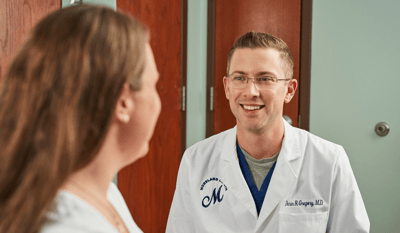When the life or health of a mother and/or her fetus is at increased risk for complications during pregnancy, we categorize it as a high-risk pregnancy.
Your doctor determines whether your pregnancy is a high risk by evaluating factors such as your existing health conditions, age, lifestyle, and progress of your pregnancy. A woman with a high-risk pregnancy often requires early and regular advanced care from an obstetrician with special high-risk pregnancy training to help her have a healthy pregnancy, delivery without complications, and protect the life of her baby.
The best time to evaluate risks related to pregnancy is prior to getting pregnant, with a preconception office visit. This way risks can be assessed and some can be decreased by certain interventions, like controlling diabetes or hypertension, discontinuing or changing to safer medications, or at least discuss risks so you have an understanding of what the risks are and mean to a pregnancy.
"High-risk pregnancies can be managed with regular visits with your physician. Take comfort in knowing that we are high-risk pregnancy specialists. Physicians often refer their patients to us because we handle high-risk pregnancies daily."
- Dr. Courtney Lemieux
Your age may be a factor in determining whether your pregnancy is high risk. Pregnant teens are more likely to develop pregnancy-related high blood pressure and anemia and experience early labor and delivery. With increasing age, some risks increase, including gestational hypertension and gestational diabetes, pregnancy loss, ectopic pregnancy, complications during delivery such as excessive bleeding, prolonged or stalled labor, or cesarean delivery. The risk of having a baby with an abnormal number of chromosomes also increases with increasing age.
 In addition, certain existing health conditions and lifestyle habits can adversely affect your pregnancy no matter your age:
In addition, certain existing health conditions and lifestyle habits can adversely affect your pregnancy no matter your age:
Overweight and Obesity. Obesity increases your risk for high blood pressure, preeclampsia, gestational diabetes, stillbirth, neural tube defects, and cesarean delivery.
High blood pressure. High blood pressure can damage your kidneys and increase the risk of low birth weight or preeclampsia.
Diabetes. High blood sugar levels during the first few weeks of pregnancy can cause birth defects. Even if your diabetes is controlled, changes may happen in your metabolism during pregnancy that may require extra care or treatment for a healthy birth.
 Kidney disease. Kidney disease can cause difficulties in staying pregnant, preterm delivery, low birth weight, and preeclampsia. You may need to make changes to your diet and medication during pregnancy.
Kidney disease. Kidney disease can cause difficulties in staying pregnant, preterm delivery, low birth weight, and preeclampsia. You may need to make changes to your diet and medication during pregnancy.
Previous preterm birth. If you went into labor early or gave birth before 37 weeks of a previous pregnancy, you are at higher risk for preterm labor and birth with your current pregnancy.
Autoimmune disease. If you have an autoimmune disease such as lupus or multiple sclerosis, some of the medicines used to treat them may cause an increased risk for preterm birth and stillbirth.
Thyroid disease. Uncontrolled thyroid disease such as an overactive or underactive thyroid can cause problems for your baby such as heart failure, poor weight gain, and brain development problems.
Polycystic ovary syndrome (PCOS). If you have PCOS, you may be at higher risk of pregnancy loss before 20 weeks, diabetes during pregnancy (gestational diabetes), preeclampsia, or cesarean delivery.
 HIV/AIDS. Human immunodeficiency virus (HIV) can pass to your baby during pregnancy, labor and delivery, and by breastfeeding.
HIV/AIDS. Human immunodeficiency virus (HIV) can pass to your baby during pregnancy, labor and delivery, and by breastfeeding.
Zika infection. Zika infection during pregnancy can increase your risk of pregnancy loss and stillbirth. Infants are at higher risk for brain and nervous system problems.
Tobacco, alcohol, or drug use. Smoking during pregnancy puts your baby at risk for preterm birth, certain birth defects, and sudden infant death syndrome (SIDS). Drinking alcohol during pregnancy can increase your baby’s risk for sudden infant death syndrome and fetal alcohol spectrum disorders (FASDs), which can include intellectual and developmental disabilities and disorders of the heart, kidneys, bones, and hearing. Recreational drug use during pregnancy can increase the risk of stillbirth and interfere with your baby’s normal brain development.
It's possible to develop high-risk conditions for yourself and your baby while your pregnancy is progressing. These conditions include:
Gestational diabetes. You may develop diabetes while you are pregnant. There can be risks associated with gestational diabetes or the need to treat with medications. Also, both you and your baby may be at increased risk of developing type 2 diabetes later in life.
Learn more now about the one-hour gestational diabetes test, also known as the O’Sullivan test.
Preeclampsia and eclampsia. Preeclampsia is a sudden increase in your blood pressure after the 20th week of pregnancy and can affect your kidneys, liver, and brain. It can affect timing or delivery, fetal growth, and the amount of fluid around the fetus. This can also lead to seizures or eclampsia.
Multiple births. Pregnancy with twins, triplets, or more fetuses, called multiple gestation, increases the risk for the babies being born prematurely (before 37 weeks of pregnancy) or by cesarean delivery. Premature infants are more likely to have difficulty breathing.
Treating a baby inside the womb. Required surgery to correct birth defects or genetic conditions that your baby may have developed, such as early detection of spina bifida and correcting common heart problems among infants with Down syndrome, is considered high risk.
In a high-risk pregnancy, your provider will want to keep a close watch on you and your progressing pregnancy to detect any potential problems as quickly as possible. Depending on your specific risk factors, your doctor may recommend the following:
 At Moreland OB-GYN, we are dedicated to providing you with exceptional, compassionate healthcare throughout your life. We specialize in evaluating and caring for high-risk pregnancy patients, which will put your mind at ease knowing you are in capable, experienced hands.
At Moreland OB-GYN, we are dedicated to providing you with exceptional, compassionate healthcare throughout your life. We specialize in evaluating and caring for high-risk pregnancy patients, which will put your mind at ease knowing you are in capable, experienced hands.
If you’re interested in learning more about how Moreland OB-GYN can help you, request an appointment today.
Phone: 262-544-4411
Fax: 262-650-3856
Monday-Thursday:
7:30 am – 6:00 pm
Friday:
7:30 am – 4:00 pm



